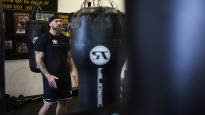General Secretary of the Finnish Professional Boxing Association Jussi Niemonen and Suek’s testing manager Katja Huotari comment on Robert Helenius’s doping suspicion and the sport’s testing practices.
Juuso Koskinen,
Jelena Leppänen
of Robert Helenius and Anthony Joshua the Matchroom Boxing promoter company that organized the boxing match said on the night between Friday and Saturdaythat the doping sample provided by Helenius contains deviations indicating a doping finding.
The testing that took place before the match was handled by an independent operator commissioned by the promoter. According to Urheilu, Helenius is suspected of using an estrogen blocker, which affects the production of the male hormone testosterone in the body.
Helenius himself strongly denies that he ever used prohibited substances, at least on purpose. The Finnish Professional Boxing Association (SAN), which administers Helenius’ competition license, states that it is on the athlete’s side before further information is received.
– It is not appropriate or factual to accuse anyone of what has not yet been proven. The original term “adverse finding” is not a direct reference to a doping violation. It’s a term for the fact that there has been something obscure in the sample, the union’s general secretary Jussi Niemonen tells Urheilu.
– We are on the side of the athletes and give them the opportunity to figure things out. Before the sanctions, we hear from Helenius. We will not decide anything until we get more information, Niemonen adds.
How is Helenius’ situation progressing?
The Finnish Professional Boxing Association says that it will next be in contact with the British Professional Boxing Association (BBBofC), which was responsible for supervising the match, and the testing agency under the anti-doping agency Vada (Voluntary Anti-Doping Association).
– Our association’s policy is that doping violations are not accepted or allowed at any level. However, possible sanctions will only be determined when all the facts are clear, Niemonen says.
According to Niemonen, the agency investigating the case, Vada, is the most effective anti-doping testing agency in the boxing world.
– Alleged abuses have been found in their tests, which the national testing organizations have not been able to find, Niemonen says.
Only the BBBofC association that supervised the match and the competitor’s licensing body, i.e. the Finnish Professional Boxing Association SAN, have the right to impose further sanctions, if deemed appropriate.
– A possible ban recommendation usually comes from the union supervising the match. Licensing associations then implement it for their part. If Helenius were to lose his competition license, he would specifically lose the license of the Federation of Finnish Professional Boxers.
Unions of other countries cannot therefore refuse Helenius’ license, only SAN. There is no international umbrella organization in the sport that could impose an international ban.
Professional boxers know when they are being tested
The same testing practices as many other sports do not apply to professional boxing, because the sport is not under the jurisdiction of the World Anti-Doping Agency WADA. Testing manager of the Finnish Sports Ethics Center (Suek). Katja Huotarin doping testing should be a surprise activity, but this is not the case in boxing.
– In the sports under Wada, the athletes are always tested. They can be tested in and out of competition anytime, anywhere. In professional boxing committed to Vada testing, the athletes know when they will be tested because they agree in a written contract to be tested eight weeks before the scheduled match, Huotari explains.
In Finland, all sports federations eligible for state aid and members of the Olympic Committee are automatically subject to the Finnish anti-doping regulations, which are supervised by Suek, the Finnish sports ethics center.
In professional boxing, testing is usually done by parties hired by match promoters, whose list of prohibited substances may be different from that of the World Anti-Doping Agency, Wada. This is also the case with Vada.
– In the activities under the World Anti-Doping Agency, substances and methods used in competition and outside competitions are distinguished. All substances are always prohibited in Vada. Wada also has thousands of pages of instructions related to testing. There isn’t that much information about Vada’s methods, says Huotari.
Vada’s policy on prohibited substances is therefore stricter and the testing methods it uses are also more obscure. The register of test results may also be thrown from one party to another.
– In boxing, each professional association is responsible for its own doping control. If a competitor competes under several federations, it is possible that the administrator of anti-doping issues will also change, Huotari knows.
The impact of the doping suspicion is for now a big question mark on the career of 39-year-old Helenius. It depends on the match-specific agreement how, for example, a positive doping sample would affect the fee for the Joshua match, which is estimated to be several hundreds of thousands of euros.
